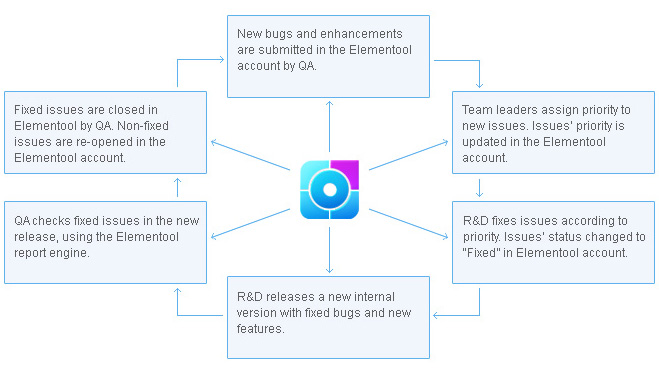|
|
|
Accurate communication is the key to the success of the bug tracking process. This
communication takes the form of timely information flow between customers, QA and
Development. Reducing the time spent on tasks that communicate bug information saves
money.
|
|
Letís explore the tasks completed daily by personnel in software development throughout
the development process. Weíll compare the time and money spent on the tasks when
they have Bug Tracking and when they donít. The average time spent on a task and
the costs per hour are based on actual experience at Elementool Inc.
|
|
Project Snapshot
|
To start, with Elementoolís Bug Tracking, the user logs in to the account and immediately
sees all relevant information. This gives a snapshot or overview of the bugs currently
in the system. They can see exactly how many issues are assigned to them. The issues
are sorted by status, severity, priority or any other criteria the user might choose.
This type of report takes about five minutes to create using in-house software or
Excel. Done once an hour that is 40 minutes a day of saved time. That is 15 hours
per month or $450 worth of a programmerís time.
Another near constant demand for the QA or development person is the need to attach
files to various issues reported to the system. Then, when a user works on fixing
a bug, they have access to the files related to the bug. For example, issues related
to the UI could be pictured in a screen shot and attached to the issue to aid in
quickly describing the problem. Thereís no need for the user to conduct a tiresome
search for the screen shot in the companyís files.
|
|

|
|
|
|
|
File Attachment
|
|
Another near constant demand for the QA or development person is the need to attach
files to various issues reported to the system. Then, when a user works on fixing
a bug, they have access to the files related to the bug. For example, issues related
to the UI could be pictured in a screen shot and attached to the issue to aid in
quickly describing the problem. Thereís no need for the user to conduct a tiresome
search for the screen shot in the companyís files.
|

|
|
Without file attachments, a developer needs to spend about 15 minutes a day searching
for files. That is five hours a month of wasted time of a developer. At an average
of $30/hour for a developerís salary that is a cost saving of $150 a month per developer
on just this simple task.
|
|
Project Control
|
|
Knowing how many open bugs there are in each stage of the project and how much time
it takes for bugs to be fixed can provide the project manager better control over
their project. Project managers find it difficult to run the project according to
schedule if they donít know at any given moment how many open bugs there are to
fix, what the priority of each bug is, which bugs can be postponed until the next
release and how long it takes for bugs to be fixed. Elementool enables you to run
a report that shows you within seconds exactly how many bugs are still open, what
their priority is and how long it takes for bugs to be fixed.
|
|
Bug Life Cycle
|
|
Tracking the bug lifecycle, important in determining the status and history of the
bug, indicates the bugís progress or lack of it. Elementoolís Bug Tracking clarifies
the picture in seconds for the entire life of the bug, including the date of reporting,
status (fixed, open, new, etc). Such precise information is not available visually
in e-mail, Excel spreadsheets or in-house tools.
|

|
|
Managing Priorities
|
|
Performing development and testing tasks according to their priority can increase
efficiency and prevent unnecessary waste of time during the product development
process. In many cases developers donít know the priority of each task and often
spend more time on low priority tasks than high priority tasks. As a result the
project is not completed on time. Elementool enables you to define the priority
and severity of individual bugs and assign them to the different developers. This
way, developers know which bugs are assigned to them and what the priority of each
bug is.
|
|
Clear Information
|
|
Elementoolís Bug Tracking is designed with customizable fields. Users submit clear
and precise information to the bug database using the bug tracking form. One example
is the Remark Message Board enabling clear communication between team members. Priority
and severity fields, environmental variables such as operating system, browser type
and hardware configuration can be placed in customizable fields as well.
|
|
Organized and clear information saves communication time for developers when interfacing
with the tester who reported the bug. When bugs are reported using Excel spreadsheets
or e-mail, the developer often needs to contact the tester to get more information.
|
|
Save Time
|
|
That extra time is costly. Itís an average of two minutes of developer time and
two minutes of a testerís time. If these actions are performed an average of 10
times a day, itís 40 minutes of wasted time. That is about 15 hours a month or $450.
|
|
In short, the savings are significant when a company uses Elementoolís Bug Tracking
for only $89.99/month. As weíve seen, for just one developer you can save over 30
hours and $1,000 per month in costs associated with project development.
|













